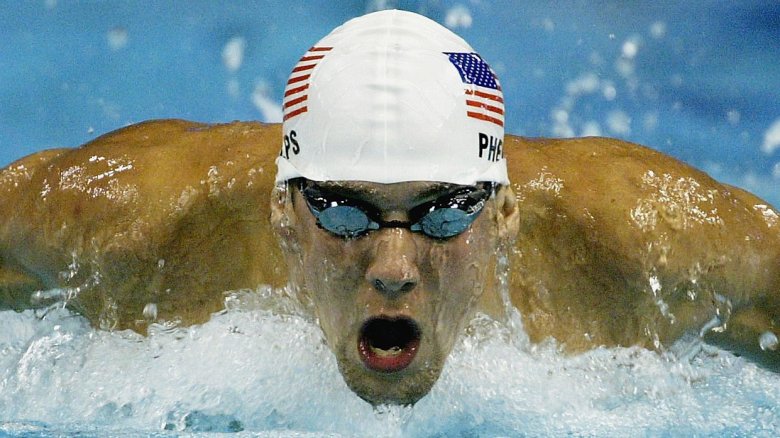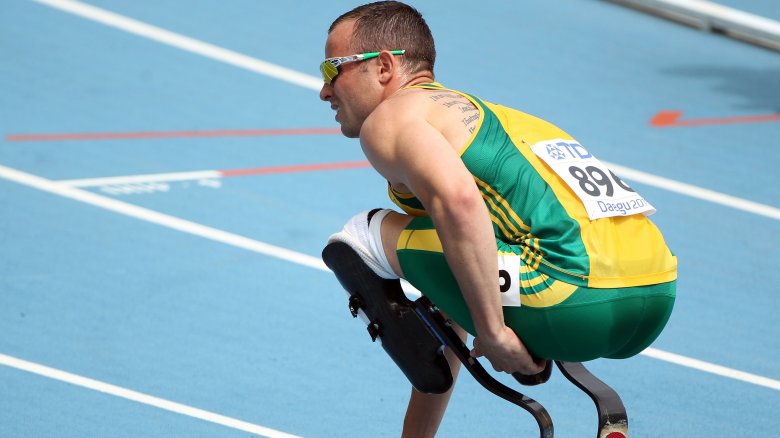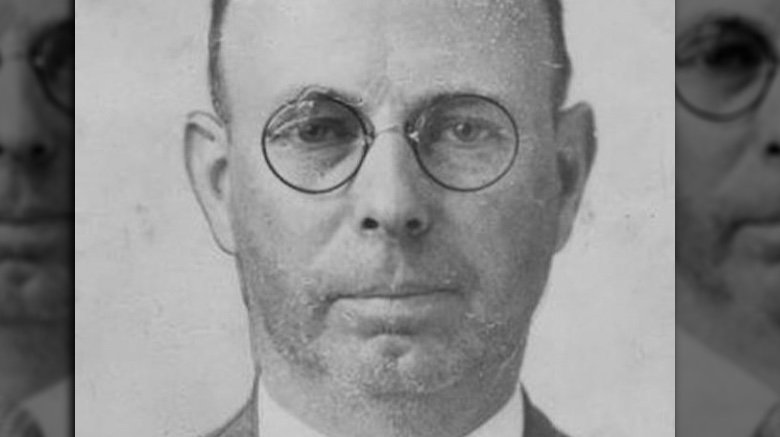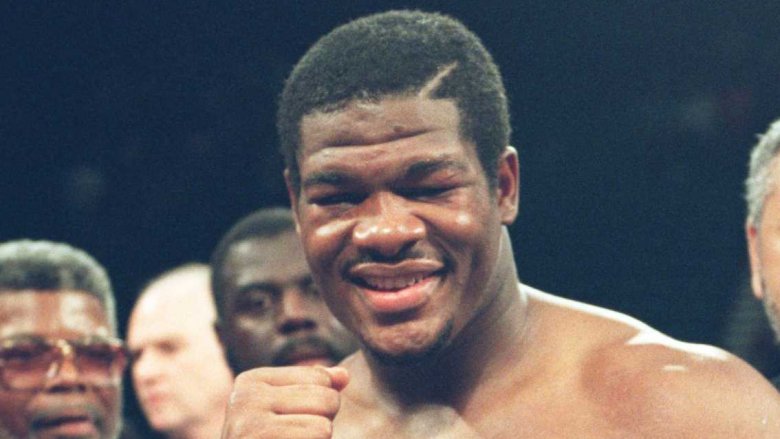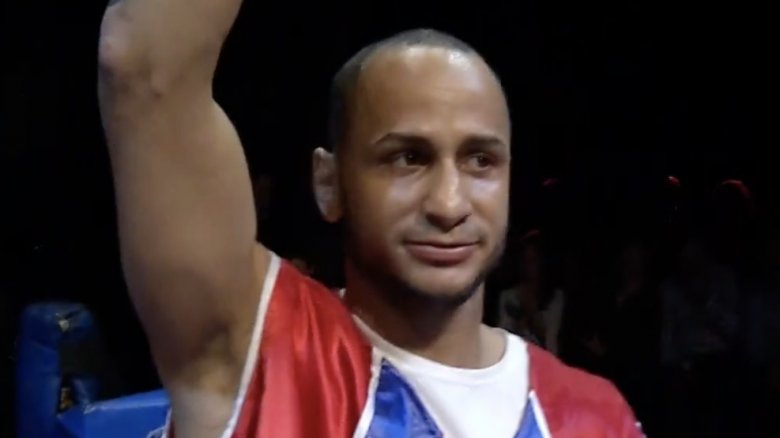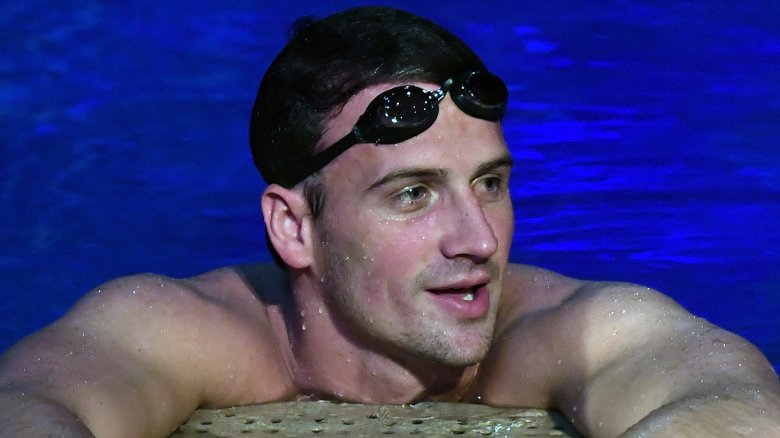Olympians Who Committed Awful Crimes
Competing in the Olympics is surely one of the greatest moments in the life of an athlete. After devoting years of their lives to the unique and difficult pursuit of perfection, it's got to be nothing but relief, vindication, and a thrill to stand on a podium with a shiny bauble around one's neck while their national anthem plays and everyone who ever doubted them is shaking their heads in disbelief while watching on TV back home.
But what comes after the Olympics? Depending on the sport, they might go pro, or headline an exhibition (like the Ice Capades), then land some endorsement deals, or show up on a Wheaties box. Then, life goes on and they go back to whatever jobs they had before, or they raise a family — regular life-type stuff. For some, that post-Olympics life included a slide into the sad, dark, and criminal. These people committed some pretty nasty acts, and got caught by the police.
The 'Blade Runner' killed his girlfriend
South African runner Oscar Pistorius was born without fibulas (one of the bones that connects your knee to your ankle), and his legs were amputated in infancy. Racing on Flex-Foot Cheetahs, thin, state-of-the-art carbon fiber prostheses (which earned him the nickname "Blade Runner"), Pistorius nevertheless became one of the greatest sprinters in the world, winning a gold medal in the 200-meter at the 2004 Paralympics, just two years after he took up running. In 2012, he became the first Paralympics sprinter to compete in the Olympics, too, running in the 400-meter.
That's all largely forgotten because of what happened on Valentine's Day 2013. Pistorius said in the middle of the night he heard what he thought was a window opening in a bathroom. Thinking he had a home invasion on his hands, he grabbed his gun, approached the darkened room, sensed a presence ... and started firing. It wasn't an intruder, however — it was his girlfriend, Reeva Steenkamp. The prosecution argued the two had been fighting and that he killed her in anger. After a seven-month trial in 2014, a judge in South Africa found Pistorius guilty of culpable homicide (the equivalent of manslaughter), in that he acted recklessly but didn't mean to kill Steenkamp. He served a year of a five-year sentence before a transfer to house arrest. Then an appellate court overturned that verdict, changing Pistorius' crime to murder. And then his sentence was upped to the legal minimum of 15 years behind bars.
Paul Hamm blew up his life over $23
At the 2004 Olympics, the seemingly mild-mannered Paul Hamm won the men's gymnastics all-around, the first American to ever win the event. Hamm provided much fodder for those human interest video packages that run during the Olympics by having a twin brother, Morgan, who also competed for the American gymnastics team that year.
In 2011, Paul Hamm hit the headlines again but not for his abilities on the high bar. Hamm went out partying one Saturday night in Columbus, Ohio, and took a cab home. He fell asleep on the way, and when the driver woke up the sleepy Olympian, Hamm wouldn't pay his $23 fare. Then he got angry and violent. "I was trying to help him to open the window and he said '[expletive] you' and he hit me with his elbow on my mouth," cabbie Abdinasir Elmi told the local CBS affiliate." Hamm damaged that window, and he also reportedly kicked and punched Elmi. When the police showed up, Hamm didn't go quietly. After admitting he'd consumed "probably eight drinks" that evening," Hamm told the officers (on video), "You guys are so funny. You guys have no idea. I'm going to kill you guys." After being charged with assault and other crimes, Hamm ultimately pleaded no contest and was put on probation.
Fast runner, fast slide down
In the late 1990s and early 2000s, Tim Montgomery was among the fastest people on Earth. At the 1996 Olympics in Atlanta, he won a silver medal as part of the USA's 400-meter relay team; in the same event at the Sydney Olympics in 2000, Montgomery took home the gold. Two years after that, he ran the 100 meters in 9.78 seconds at an international competition.
Then Montgomery found himself linked to the Bay Area Laboratory Co-operative (BALCO), the sports medicine facility investigated for dispensing performance-enhancing drugs to elite athletes. In 2005, the Court of Arbitration for Sport handed Montgomery a two-year ban from his sport. (The runner later admitted that he had used both testosterone and human growth hormone.) Needing to earn a living some other way, Montgomery teamed up with fellow Olympian Steve Riddick and started a lucrative check fraud scheme that netted them $1.7 million ... and for Montgomery, a guilty plea on fraud charges that resulted in a 46-month prison sentence. While appealing that case, police in Virginia busted Montgomery for selling heroin. That added five years to his prison term, of which he ultimately served a little over four years.
The veterinarian and Olympic shooter who killed his young paramour
Dr. James Snook was a graduate of and later professor at the Ohio State University's Veterinary College. (He also invented a widely used spaying tool called the Snook Hook.) Not only could he cut a dog in the right places, he was good with a gun, and in 1920, he took his skills all the way to the Olympics. At the age of 42, Snook won two gold medals, one for the 30-meter military pistol event, and the other in the 50 meter. All that was a distant memory by 1926, when Snook began an affair with OSU student and Veterinary College stenographer Theora Hix, 23 years Snook's junior. (Snook later described the relationship as one of carnal convenience. "I never loved Miss Hix and she did not love me. She served my purposes and I served hers." What a sweet-talker.)
In June 1929 Snook took Hix out for an evening of drug-taking and loving in his Model T. Snook apparently endured so much pain during the romantic part of the evening that he reached for a hammer he kept in the car and struck Hix in the head with it a few times. Then he slit her throat with a pocketknife to finish the job. After Hix's remains were discovered, Snook was arrested and confessed. In February 1930, he met his end in the electric chair.
From the pool to the registry
One thing that Olympians can do when they return to civilian life: coach. Who wouldn't want someone who competed in the Olympics to train their kids in that very sport? Well, if the coach in question is Doug Northway, an Olympic swimmer who went to prison on some revolting charges, no parents would want him as a coach.
Northway was a three-time Olympian. At the 1972 Summer Olympics in Munich, he won a bronze medal in the 1,500-meter freestyle, competed (but didn't medal) in the 800-meter freestyle at the 1976 Summer Olympics in Montreal, and made the team for the 1980 Moscow Olympics, which the U.S. ultimately boycotted. After retiring from competition, Northway became a pastor and swim teacher in Tucson, Arizona. Up until 1995, that is, when a 9-year-old female student of Northway's told her parents that the coach had attempted to fondle her. After an investigation and arrest, Northway stood trial for attempted child molestation. A judge found him guilty and sentenced him to four months in prison, a lifetime of probation, and an order to register as a sex offender.
Dick Boushka was the real deal on the court, and a fraud off it
The American men's national basketball absolutely smoked the competition in the 1956 Summer Olympics in Melbourne, winning all eight of its games on the way to gold medals, with '92 Dream Team-esque scores of 101-29 and 121-53. Future Boston Celtics legends and Hall of Famers Bill Russell and K.C. Jones provided a lot of the scoring, but Dick Boushka was no slouch either, averaging 8 points per game in that particular Olympiad. He was also a huge star in college ball, averaging 19.6 points per game over three seasons at Saint Louis University. Although drafted by the Minneapolis Lakers, Boushka never played in the NBA. He instead went on to be the president of a petroleum company and spearheaded the construction of a dog-racing track in Kansas. Entrenched in the world of big money and land development, 69-year-old Boushka wound up going to prison for assorted white collar crimes in 2004. A federal judge gave him 70 months for a bank fraud charge, 70 months for making a false statement to obtain a loan, and 60 months on "one count of omission of material information in the sale of a security."
Riddick Bowe did some terrible things to his family
Riddick Bowe is a well-known heavyweight boxing champion, taking the title in one of the sport's golden eras, the '90s, alongside guys like Evander Holyfield, whom he beat twice and lost to once. But before his 43-1 lifetime professional record, Bowe took the silver medal for the U.S. in Seoul in 1988 in the super heavyweight class.
In 1998, Bowe committed some shocking crimes against his kin. Seeking to rekindle his relationship with his estranged wife, Judy, Bowe kidnapped her and their five children at knife-point from their home in Charlotte, North Carolina, and forced them into a car to head to his house in Fort Washington, Maryland. When they stopped at a McDonald's (as one does during a kidnapping attempt, apparently), Judy snuck into the bathroom and used a cell phone to ask a relative to call the police. Officers soon arrested the boxer.
Brain damage was an issue in the trial, as a psychiatrist testified that Bowe had sustained so many punches to the head in the ring that it had affected his judgment to the degree where kidnapping his family seemed like a good idea. In 2000, a judge in North Carolina sentenced Riddick Bowe to 30 days in federal prison, six months of house arrest, four years of probation, and an order to undergo medical treatment for brain injuries sustained in the ring.
America's greatest Olympian was drunk behind the wheel
Like some kind of superpowered dolphin-human hybrid, swimmer Michael Phelps collected medal after medal for nearly 20 years. Competing in five different Olympics from 2000 to 2016, Phelps won 28 medals overall, 23 of which were gold, the biggest one-man medal count ever for an American. Phelps also privately struggled with alcohol. In November 2004, police in Maryland stopped Phelps after he ran a stop sign. An officer found that Phelps had a blood alcohol level of .08 — just at Maryland's legal limit, but not okay because Phelps was not yet 21 years old. He pleaded guilty and earned a sentence of 18 months of probation and a judge's order to stay away from alcohol and drugs.
Nearly 10 years later, in September 2014, Maryland police once again nabbed Phelps for driving under the influence. They pulled him over after he veered into the other lane while driving through a tunnel, and also for going 84 in a 45 mph zone. In a blood alcohol test, Phelps hit .14, well over the legal threshold. Once more, Phelps received 18 months of probation, but he reported that he was seeking therapy for his problem and that he'd been attending Alcoholics Anonymous meetings.
The short and violent life of Alex de Jesus
His nickname was "El Pollo," but Alex de Jesus was no chicken. After all, he willingly entered the ring as an amateur boxer in his native Puerto Rico before quickly moving up to big international matches in the early 2000s. The super lightweight took the silver medal at the 2002 Central American and Caribbean Games, as well as at the 2003 Pan American Games. From there, it was on to the 2004 Summer Olympics in Athens, where de Jesus fought two matches, winning one and losing the other, and failing to medal. Upon his return to Puerto Rico, de Jesus turned pro and won nearly all of his first 20 bouts. Then his career and life suffered some hiccups when, in 2010, he was arrested and sentenced to four-plus years in prison on domestic violence and weapons charges.
He resumed his career upon his release, as well as his troublingly violent ways. In 2016, de Jesus' stepmother filed a criminal complaint against the 33-year-old boxer, claiming he attacked her. Just a few hours after Puerto Rican police put out a warrant for de Jesus' arrest, he was shot 12 times while walking down the street.
As it turned out, Ryan Lochte was the perpetrator, not the victim
Ryan Lochte: champion swimmer (12 medals over four Olympic Games), Dancing with the Stars competitor ... and big-time liar. Toward the end of the 2016 Summer Olympics in Rio de Janeiro, Lochte and three other American swimmers were in a cab when, as Lochte reported to NBC, "we got pulled over, in the taxi, and these guys came out with a badge, a police badge, no lights, no nothing just a police badge and they pulled us over." Then, Lochte said, "they pulled out their guns, they told the other swimmers to get down on the ground." One of the men then reportedly placed the gun to Lochte's head and robbed him of his wallet, but left the swimmer's phone and Olympics credentials behind.
Local police investigated and found absolutely no evidence that the hold-up took place ... but they did uncover security footage of Lochte and his fellow swim-bros vandalizing a gas station — they allegedly urinated all over the bathroom, for example. A man had aimed a gun at Lochte that night, but it was a security guard at that gas station. Police charged Lochte with falsely communicating a crime to authorities, but he had already left the country and the charge was later dismissed.
